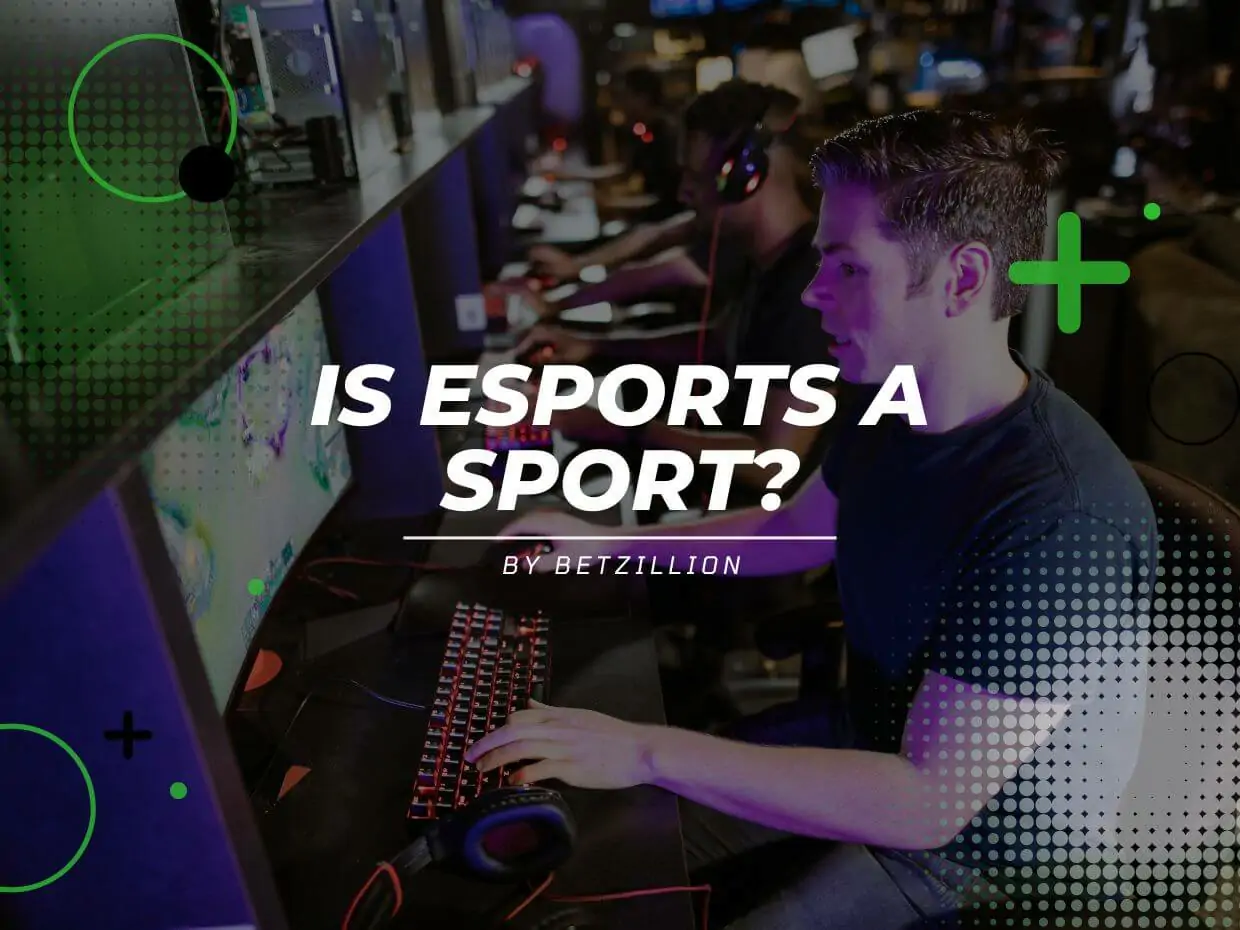This website uses cookies so that we can provide you with the best user experience possible. Cookie information is stored in your browser and performs functions such as recognising you when you return to our website and helping our team to understand which sections of the website you find most interesting and useful.
Is Esports a Sport?

In the past few years, a new favorite sport emerged – Esports. Except that it’s not a sport recognized by many. There’s been a heated debate between supporters of the theory that Esports is a sport and their opponents. Many experts believe it can never be a sport, but tournaments and prize pools say otherwise.
What Is Esports?
Before we dive deeply into the controversial questions, let’s talk more about it. By definition, it is a form of competition that involves video games. Most commonly, it takes the form of organized multiplayer video game competitions, some worth millions of dollars. It is played between professional teams and players individually and in groups.
Pro tournaments are one of the many reasons why Esports is a sport. It’s undoubtedly considered one by many countries and organizations. Experts believe it is a sport, too, with many coming from the highest levels. Some, like the Olympic committee, have considered making it an Olympic sport. While that hasn’t happened so far, it has come close several times.
If you ask pro players, it’ll happen before we know it. However, becoming a sport takes a lot of effort and convincing the critical people that it’s truly a sport. Things are going in that direction, but don’t expect a resolution soon.
Should Esports Be Considered a Sport?
Formally, it has been recognized as one by countries such as Pakistan. It was the first country to accept it as a sport, and others have followed its example. It is widely considered a sport by many universities, organizations, and the Asian Games. The latter gives the main idea of the wings it needs to fly.
But is it real if it’s virtual? That’s a pretty big obstacle and the main complicating factor. Many critics say it’s much easier to kick a ball virtually than in the real world. Of course, there’s a decent chance that they’ve never played an Esports game to see if it’s straightforward.
What are the pros and cons of Esports becoming a sport? Let’s find out below.
Why Should Esports Be Considered a Sport?
First things first – it takes a lot of skill and ability to play in a match or tournament. Contrary to popular belief, being a professional gamer requires much effort and training, just like becoming a football player. Concentration, precision, and execution are the 3 main aspects of the movement. No one can be a pro gamer without thousands of hours of training. It is one of the main reasons why it is considered a sport among fans.
Surprisingly, players have a peak (or prime) spot in their careers, just like basketball, football, or tennis players. Do you know how footballers tend to peak between 25 and 30? Similar to basketball players? Well, studies have found that players peak at around 25. It has been proven several times before, drawing references to peaks in other sports.
Why Should Esports Not Be Considered a Sport?
Many believe in the central narratives of Esports being a sport, but many people think otherwise. The main argument in denying it as a sport is that it doesn’t involve any physical exertion. It doesn’t require much in the way of fitness. No running or jumping is involved, and fairness and scoring are challenged. As such, players can’t be called athletes.
Unlike recognized sports, some players have an unfair advantage due to balance and meta changes. The rules often change, which goes against the nature of sports, where rules rarely change. It is the viewpoint many sticks to when denying Esports as a sport.
There are two sides to the same coin regarding arguments on Esports being or not being a sport. Recognizing it as a sport will require careful consideration, as both should be thoroughly checked. Then there’s the argument many pros believe – that it doesn’t need to be a sport because it transcends traditional sports.
Esports Vs. Sports: Key Similarities \ Differences
There are many ways in which it differs from traditional sports. Let’s compare both and explore their similarities and differences.
| Feature | Esports | Traditional sports |
|---|---|---|
| Physical Exertion | Minimal physical activity with a focus on fine motor skills and reflexes | High physical activity, endurance, and fitness |
| Skill | Focus on reaction time, motor skills, and hand-eye coordination | Requires diverse skills like dribbling, passing, shooting, and more |
| Age | Aside from age restrictions for specific games, any age can participate | There are usually age groups for certain sports |
| Gender | All genders participate together | There are different tournaments, leagues, and competitions for each gender |
| Equipment | Players must use specialized equipment to compete, such as gaming computers and monitors. | Traditional sports players must also use specialized equipment to compete, such as footballs, baseball bats, and hockey sticks. |
| Location | Players can compete anywhere in the world if they have a good internet connection. | Traditional sports players must be physically present at the game venue to compete. |
| Changes | Utilizes technological advances to its advantage and makes appropriate changes | Minimal changes occur to traditional sports, be it in terms of rules or types of equipment |
| Global Audience | Massive online viewership; global tournaments attract millions of viewers | Large fan base worldwide, especially in major sports like football |
Generally, the similarity between it and every traditional sport is that both promote healthy and fair competitions between players with rules and regulations that guide their gameplay. As for the difference between them, the primary point is that it doesn’t require physical exertion, unlike the other traditional options.
In fact, due to its virtual nature, players don’t have to be physically together to compete as a team during an event or tournament. Also, aside from age restrictions on specific games, anyone can participate in it, regardless of gender. Traditional sports, on the other hand, typically have established structures for different categories for age and gender.
In the end, until we get official confirmation, the verdict’s still out.
Countries That Recognize Esports as a Sport
South Korea is the first country to accept Esports as a sport. It’s also widely popular, with many pros coming from this particular country. Contrary to this, Germany has many vocal experts against it but still accepts it as a sport.

Surprisingly, Esports is a real sport in Pakistan, and other countries in the Middle East and Africa, namely China and South Africa. In 2020, Ukraine officially recognized it as a sport, as did Italy, Denmark, Nepal, and Russia. More recently, Finland and the USA have accepted it, which isn’t surprising as many major teams and players come from these countries.
Many countries are soon expected to jump on the bandwagon. With tournaments getting bigger and it gaining vocal support from many experts and athletes, it won’t be long before the world accepts it.
ESPN and Esports
It is getting extensive coverage on major media outlets. There’s undoubtedly a TV station or 2 covering significant tournaments and international matches in your country. But it also made the news on the big stage when ESPN embarked on a new and bold journey in 2016. The move came at the right time, just as Esports as a sport was heating up.
Much money was poured into the ESPN Esports channel, with well-known celebrities and sports icons involved. With platforms such as Twitch and Youtube, the channel received much attention.
It continued for years, and no one was sure why such a major media outlet made that decision. In general, the sports channel needed something fresh, and between gambling, daily fantasy sports, and Esports, the latter won the popular vote. It was a highly controversial decision that finds a new fanbase for a channel that needed it.
However, the biggest problem was that ESPN’s boss called Esports not a sport a couple of years before the decision. John Skipper didn’t have time for video games, but he surely got the memo when the Esports ESPN channel started two years later. For about four years, the channel worked hard to get it on the sports side, and it managed to sway many of the population. ESPN aired more than 20 events during the first year and had a dedicated Esports day.
Somewhere along the line, the team changed, and it all fell off the rails. While the Esports section can still be viewed, it didn’t live up to the hype. It gives fuel to the doubters, but even without ESPN’s coverage, major international tournaments are a go.
How to Get into Esports
It levels the playing field, unlike many traditional sports that rely heavily on specific physical traits. Individuals from all walks of life, whether short, tall, fit, etc., have the unprecedented opportunity to become bona fide sports players. However, becoming a professional is no easy feat like any other sport. It also requires hard work, dedication, and resilience.
That said, here are some tips on how to get in, whether as a casual player or a professional.
- Choose a Game: The first step to getting into it is to choose a suitable game. There are many options to play, from Counter-Strike to Leagues of Legends, Fortnite, Overwatch, etc. And each game has its unique mechanics, strategies, and player community. So, take your time to explore the different titles available and find the one that ignites your passion.
- Understand the Game: Before attempting something, it is often best to understand how it works. It is the same. You should delve into your chosen game’s rules, mechanics, and strategies. You can study guides, watch relevant tutorials, and observe professional players to gain insight into advanced tactics.
- Practice, Practice, Practice: Once you have learned how the game works, the next stage is to hone your skills. Becoming proficient in a sport requires practice, which is valid. You should set aside time for practice sessions to improve your skills and learn new strategies and tactics. You can do this solo and with others.
- Build an online presence and join a community: It is vital in this digital age as it allows you to connect with people millions of miles away. It takes advantage of this to create forums, social media groups, and communities where players worldwide can connect and interact with each other online. So, create an online presence and connect with fellow enthusiasts and professionals in the industry via forums, social media groups, and communities. These platforms can be a great way to learn from more experienced players, receive tips, and find exciting tournaments you can join.
- Attend Tournaments: Once you have developed your skills, you can attend tournaments. It can be an excellent opportunity to test your abilities, gain valuable experience, learn from other players, and get exposed to the scene.
- Seek coaching: If you want to up your gameplay, consider enlisting the aid of experienced coaches and mentors. These coaches provide personalized guidance, offer constructive criticism, and accelerate performance.
- Consider joining a team: If you are interested in one day going pro, then you should consider joining a team. Teams can provide structure and support during your journey. So, looking for amateur or semi-professional teams that align with your game and play style is best.
The Future of Esports
Esports is not a sport yet, but we live in a time where that could change quickly. The number of countries that update their status has grown, and many others are waiting to jump on the bandwagon. Glancing at the major international tournaments will show you that the reality should be different. Esports betting sites are pretty fond of it, and we all know how tight the link between fast withdrawal bookmakers and sports is.
The future is exciting as its narrative shifts. Millennials believe it is a sport and will treat it that way for good, which is great and goes in its favor. As long as pro tournaments catch the public’s attention with millions in prizes, narrative will change positively.
Final Words
The future is undoubtedly bright. As mentioned earlier, things are beginning to change, and more and more people realize that not recognizing it as a sport is a mistake. The denial of it as a sport is slowly fading, and another narrative is occurring. Esports pros train just as hard as football players, even if they don’t do it physically. It takes a lot of preparation, training, and patience to get to the top, reminiscent of athletes’ effort to win.
Plus, every real sport has a counterpart in Esports. Football has FIFA and PES. Basketball has 2K games. There are NFL games, baseball games, and games based on other sports too. Athletes admit they play with friends or competitively, which speaks a lot about it.
It’s more than just playing with friends. You can head to the top of the mountain if you take the time to train, and climbing that mountain requires the same effort as basketball stars finally winning a title. That’s why at BetZillion we think Esports should be considered a sport.
Frequently Asked Questions
-
Should Esports be considered a sport?In our honest opinion, yes, it should. Esports pros spend years training to get to the top, like any athlete’s career goal. It doesn’t require the same physical effort as other sports, but training is essential.
-
Is Esports an Olympic sport?Not yet. There’s been plenty of discussion on this question, and there were plans to include it in some previous Olympic Games. Ultimately, the decision went against it, but nothing is off the table for the future.
-
Why should Esports not be considered a sport?Esports doubters cite the lack of physical exertion as the main reason to vote against it becoming a sport. However, they rarely consider the rigorous training, not counting the considerable mental preparation. If you compare athletes’ training and pros, you’ll see that they chase the same goal with other means.
-
Does the government recognize Esports as a sport?Not every government recognizes it as a sport. So far, the countries that recognize it include Pakistan, Russia, Italy, and the USA, with many others joining soon.
-
Still have questions?
Ask our experts


